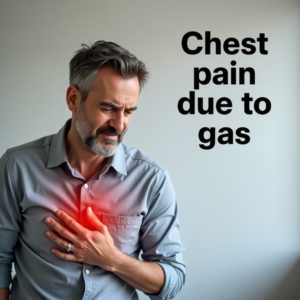
Chest pain is a common symptom that can be alarming. While many associate it with heart problems, it’s important to note that gas can also be a culprit. Understanding the signs, causes, and treatment of chest pain due to gas can help alleviate anxiety and seek appropriate medical attention when necessary.
Symptoms of Chest Pain Due to Gas
Gas-related chest pain can manifest in various ways, often mimicking heart pain. Some common symptoms include:
- Sharp, stabbing pain in the chest
- Tightness or pressure in the chest area
- Discomfort that might extend to the back or shoulders.
- Discomfort that worsens after eating
- Bloating and excessive burping
- The feeling of fullness in the abdomen
Causes of Chest Pain Due to Gas
Gas-related chest pain is typically caused by excessive gas accumulation in the digestive system. This can occur due to:
- Swallowed Air: Eating or drinking too quickly can lead to swallowing air, which may accumulate in the digestive tract and cause discomfort.
- Digestive disorders: Conditions like irritable bowel syndrome (IBS) or gastroesophageal reflux disease (GERD) can contribute to gas buildup.
- Overeating or consuming certain foods: Foods such as beans, lentils, and carbonated beverages can lead to increased gas production.
- Gastrointestinal Disorders: Conditions like irritable bowel syndrome (IBS) or lactose intolerance can result in excessive gas and bloating.
Diagnosis of Chest Pain Due to Gas
Accurate diagnosis is crucial to differentiate gas-related pain from more serious conditions. The diagnostic approach typically includes:
- Medical History: A thorough review of the patient’s dietary habits, lifestyle, and any related symptoms.
- Physical Examination: The physician will check for signs of bloating or tenderness in the abdomen.
- Diagnostic Tests: Tests may include:
– Electrocardiogram (ECG): To rule out cardiac conditions.
– Abdominal Ultrasound: To check for any gas-related abnormalities.
– Endoscopy: If gastrointestinal disorders are suspected.
Treatment
Managing chest pain due to gas involves addressing both the gas buildup and the associated symptoms:
- Dietary Adjustments: Avoiding gas-producing foods Spicy food and beverages can help reduce symptoms. Consuming smaller, more frequent meals may also provide benefits.
- Over-the-Counter Medications: Products containing simethicone can help break down gas bubbles, alleviating discomfort. The use of proton-pump Inhibitors alleviates gastric discomfort.
- Lifestyle Changes: Reducing stress and incorporating regular physical activity can aid digestion and reduce gas formation.
- Home Remedies: Techniques such as gentle abdominal massage or heat application can provide temporary relief.
Prevention
Preventing chest pain due to gas involves lifestyle modifications:
- Eat slowly and chew food thoroughly
- Avoid talking while eating
- Limit intake of gas-producing foods
- Stay hydrated with water instead of carbonated drinks
- Practice stress management techniques
- Regular exercise to promote healthy digestion
- Avoid smoking and excessive alcohol consumption
Difference Between Gas Pain and Heart Pain
While gas pain and heart pain can share similar symptoms, there are key differences to consider:
Gas Pain:
- Often changes with body position or breathing
- May be accompanied by bloating and burping
- Usually occurs after eating
- Can be sharp or stabbing
Heart Pain:
- Often described as pressure, squeezing, or heaviness
- It might extend to the arm, jaw, or back.
- It may occur alongside difficulty breathing, excessive sweating, feeling of nausea, or giddiness.
- Usually not related to body position or eating
Conclusion
In conclusion, while chest pain due to gas can be uncomfortable and distressing, it is usually manageable with proper dietary and lifestyle adjustments. However, it is crucial to consult a healthcare professional to rule out more serious conditions and receive appropriate care. At HOSMAT Hospitals, the best multispeciality hospital in Bangalore, we are dedicated to providing comprehensive diagnostic and treatment services to address all aspects of chest pain, ensuring your health and well-being.
Disclaimer: This article is for informational use only and is not a replacement for professional medical guidance. If you experience chest pain, please consult a healthcare professional.


